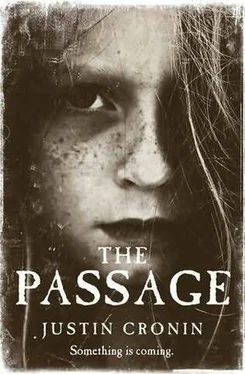Jude shook his head doubtfully. “I don’t think so.”
“No, ask her. She saw the whole thing.” Michael turned his head to look at Billie; she was observing him coolly, that same look of neutral concern on her face. “I remember it distinctly. You used the gun on one of them, and Amy pulled me into the truck. Then we heard the explosion.”
But before Billie could respond, Hollis broke in: “I think you’ve got it a little mixed up, Michael. I was the one who pulled you into the truck. The hotel was already burning. That’s probably what you’re thinking of.”
“I could have sworn… ” Michael fixed his eyes on Jude again, his chiseled face. “And you were in a shelter, you say?”
“That’s pretty much it.”
“Three blocks away.”
“About that.” An indulgent smile. “Like I said, I wouldn’t second-guess a stroke of luck like that, my friend.”
Michael felt the nervous heat of everyone’s attention. Jude’s story didn’t add up; that was obvious. Who would leave the safety of a fortified shelter at night and drive toward a burning building? And why was everyone going along with it? The streets on three sides of the hotel were all blocked by rubble. That meant Jude and Billie could only have come from the east. He tried to recall which side of the building they’d exited from. The south, he thought.
“Oh hell, I don’t know,” he said finally. “Maybe I’m not remembering it right. To tell you the truth, the whole thing is pretty mixed up in my mind.”
Billie nodded. “That’s to be expected after a long period of unconsciousness. I’m sure in a few days things will start to come back to you.”
“Billie’s right,” said Peter. “Let’s let the patient get some rest.” He directed his voice to Hollis. “Olson said he’d take us out to the fields to look around. See how they do things.”
“Who’s Olson?” Michael asked.
“Olson Hand. He’s in charge around here. I’m sure you’ll meet him soon. So, how about it, Hollis?”
The big man offered a close-lipped smile. “Sounds great.”
With that, everyone rose to leave. Michael had resigned himself to lying in solitude, puzzling over these strange new circumstances, when at the last instant Sara darted back to his bedside. Jude was observing her from the edge of the screen. Taking hold of Michael’s hand, she kissed him quickly on the forehead-the first time in years she had done this.
“I’m glad you’re okay,” she said. “Just focus on getting your strength back, okay? That’s what we’re all waiting for.”
Michael listened closely for their departure. Footsteps, then the sound of a heavy door, opening and closing again. He waited another minute, to be certain he was alone. Then he opened his hand to examine the folded slip of paper Sara had secreted there.
Tell them nothing .
The party Peter had spoken of had been held the previous evening, the third night after their arrival. This had been their one chance to see everyone, the whole of the Haven, in one place. And what they saw did not ring true.
Nothing did, beginning with Olson’s claim that there were no virals. Just two hundred kilometers to the south, Las Vegas was crawling; they had traveled at least that far from the Joshua Valley to Kelso, through similar terrain, and the virals had followed them the whole way. The stink of that herd, Alicia pointed out, would travel far downwind as well. And yet the only perimeter appeared to be a metal fence, far too insubstantial to protect against an attack. Except for the flamethrowers on the vans, Olson had confessed, they had no useful weapons at all. The shotguns were just for show, all their ammunition having been used up decades ago.
“So you see,” he had told them, “our existence here is an entirely peaceful one.”
Olson Hand: Peter had never met anybody like him, so apparently at ease with his own authority. Apart from Billie and the man known as Jude, who seemed to function as his aides, and the driver of the truck that had brought them from Las Vegas-Gus appeared to be a kind of engineer, in charge of what they termed “the physical plant”-Peter could detect no other structures of command. Olson had no title; he was simply in charge. And yet he wore this mantle easily, communicating his intentions with a gentle, even apologetic manner. Tall and silver-haired-like most of the men, Olson wore his hair in a long ponytail, while the women and children were all closely shorn-with a stooped frame that seemed to barely fill his orange jumpsuit and a habit of placing the tips of his fingers together when he spoke, he seemed more like a benevolent father figure than someone responsible for the lives of three hundred souls.
It was Olson who had told them the history of the Haven. This had transpired within the first hours of their arrival. They were in the infirmary, where Michael was being attended by Olson’s daughter, Mira-an ethereal, slender-limbed adolescent with close-cropped hair so pale and fine it was almost transparent, who seemed to regard them with a nervous awe. After they had been carried from the van, the seven of them had been stripped and washed, their belongings confiscated; all would be returned, Olson had assured them, except for their weapons. If they chose to move on-and here Olson had paused to note, with his customary mildness, that he hoped they would elect to stay-their weapons would be returned to them. But for now their guns and blades would remain locked away.
As for the Haven: A lot was simply not known, Olson explained, the stories having evolved and changed over time until it was no longer clear what the truth really was. But a few points were generally agreed on. The first settlers had been a group of refugees from Las Vegas who had come there in the last days of the war. Whether they had come by design, hoping that the prison, with its bars and walls and fences, might offer some safety, or had simply stopped here on the way to someplace else, no one could know. But once they realized there were no virals, the surrounding wilderness being too inhospitable-forming, in fact, a kind of natural barrier-they had chosen to remain and eke out an existence from the desert landscape. The prison complex was in fact made up of two separate facilities: Desert Wells State Penitentiary, where the first settlers had housed themselves, and the adjacent Conservation Camp, a low-security agricultural work camp for juvenile offenders. That was where all the inhabitants now lived. The spring from which the prison took its name provided water for irrigation, as well as a steady stream of water to cool some of the buildings, including the infirmary. The prison had provided much of what they needed, right down to the orange jumpsuits nearly everyone still wore; the rest they scavenged from the towns to the south. It was not an easy existence, and there were many things they lacked, but here at least they were free to live their lives without the threat of the virals. For many years they had sent out search parties to hunt for more survivors, hoping to lead them to safety. They had found some, quite a few in fact, but not for many years, and had long since given up hope of ever finding any more.
“Which is why,” Olson had said, smiling benignly, “your being here is nothing less than a miracle.” His eyes actually misted over. “All of you. A miracle.”
They had spent that first night in the infirmary with Michael and were moved the next day to a pair of adjacent cinder-block huts on the outskirts of the work camp, facing a dusty plaza with a pile of tires in the center, the edges lined by fire barrels. This was where they would spend the next three days in isolation, a mandatory quarantine. On the far side were more huts, which appeared to be unoccupied. Their quarters were spartan, each of the two huts with just a table and chairs and a room in the back with cots; the air was hot and dense, and the floor crunched underfoot with grit.
Читать дальше












